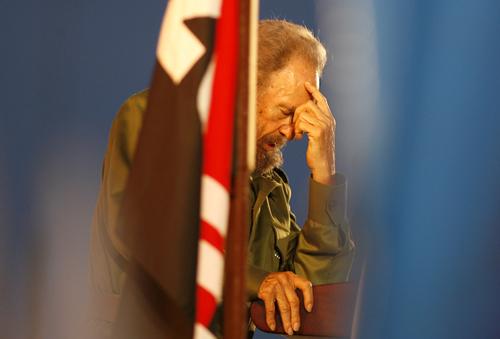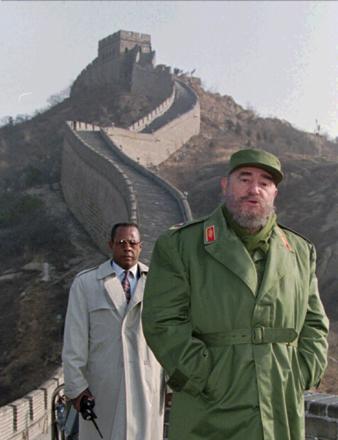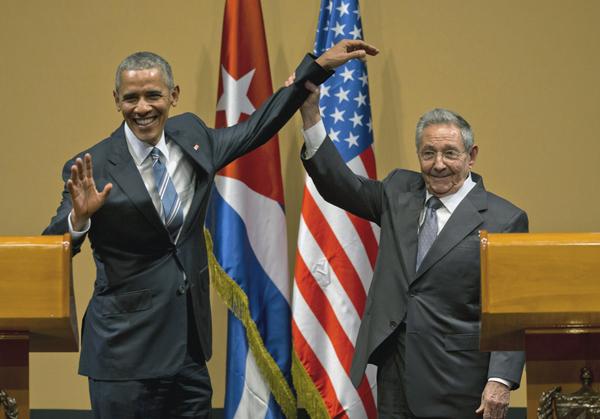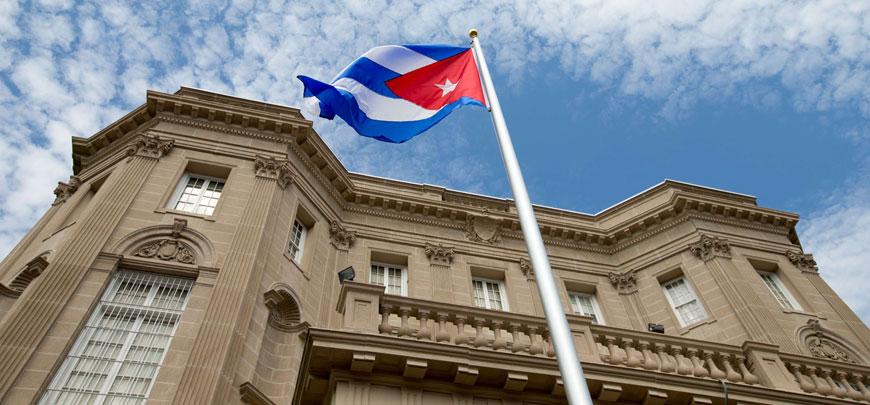You are here
Iconic leader Fidel Castro turns 90 in new Cuba
By AFP - Aug 13,2016 - Last updated at Aug 13,2016

In this July 26, 2006 file photo, Cuba’s president Fidel Castro pauses as he addresses a crowd of Latin American students gathered in Pedernales in Holguin province, Cuba, for the anniversary of the attack on the Moncada barracks (AP photo)
HAVANA — Cuban revolutionary leader Fidel Castro turned 90 on Saturday in an island transformed from the one he led for half a century.
Both loved as a hero and hated as a dictator, Castro is one of the giant figures of modern history.
He defied 10 US presidents during his 48 years in power, but in the decade since he stepped aside Cuba has become a different world. His sworn foe, the United States, is no longer officially Cuba’s enemy.
Warrior
Now white-bearded and frail, Castro was a strapping 32-year-old in green fatigues when he led a rebel force that drove out dictator Fulgencio Batista in 1959.
His image as a revolutionary warrior storming down from the mountains, rifle in hand, stirred his admirers’ imagination. His communist policies and iron-fisted treatment of rivals drew the hostility of the United States and other Western powers.
His voice used to boom out over Havana in speeches that lasted hours. Nowadays he is rarely heard from, although his face still smiles out from countless billboards across the Caribbean island.
No official public events were scheduled to mark his birthday. The former president spends his days out of sight at home.
But in an article published by official media late Friday, Castro showed that he had lost little of his old fire, particularly when it comes to his longtime enemy the United States.
He criticised US President Barack Obama for failing to explicitly apologise during his historic visit to Japan in May for Washington’s decision to drop the atomic bomb on Hiroshima in 1945. He condemned as “equally criminal” the bombing of Nagasaki three days later.
Referring to the scores of US assassination plots against him — Cuban intelligence services numbered them at more than 600, some reportedly involving poisoned or explosive cigars — he said, “I almost laughed at the Machiavellian plans of US presidents.”
‘Dictator’
Although mostly out of sight, Castro has not been out of the minds of ordinary Cubans. State newspapers on the communist island have for days been printing pictures and articles about him to mark his 90th year. Concerts have been played in his honour.
Fidel Castro retired from public life in 2006 due to ill health. He formally transferred the presidency to his brother Raul in 2008.
But Fidel continues to exert “an indirect influence through certain figures in the regime who are not comfortable with the reforms that Raul has made,” said Kevin Casas-Zamora, a political scientist at Oxford University.
Raul, 85, has gradually opened up Cuba’s economy and foreign relations, restoring diplomatic relations with Fidel’s old foe, the United States.
Such reforms were unthinkable when Cuba was a pro-Soviet state on the United States’ doorstep during the Cold War.
Fidel gave free healthcare, housing and schooling to citizens on a poor island.
“Fidel is everything. He is sport, he is culture. He is rebellion. If Cubans are rebels, it is thanks to Fidel,” said Manuel Bravo, a 48-year-old glazier.
But the former president’s regime is also accused by human rights groups of brutally repressing dissent by torturing and jailing opponents.
“I will remember him as a dictator,” said Martha Beatriz Roque, 71, an anti-Castro dissident who was one of 75 opponents jailed in the “black spring” of 2003.
“He is the man of ‘E’s: egomaniacal, egotistical, egocentric,” she said.
“I don’t know whether I will be able to wish him a happy birthday.”
Hero
Castro has reportedly suffered from intestinal illness in recent years. But official secrecy shrouds his condition.
He last appeared in public on April 19 at the close of the Cuban Communist Party Congress.
Dressed in a blue tracksuit and speaking in a trembling voice, he seemed to say goodbye.
“Soon I’ll be like all the rest,” he said. “Everyone’s turn comes.” After Barack Obama visited Cuba in March, Castro recalled the island’s long enmity with the United States, including Washington’s backing for the failed invasion of Cuba at the Bay of Pigs in 1961.
His bitterness over that botched CIA plot played a part in pushing the world to the brink of nuclear war during the Cuban missile crisis the following year. The Soviet Union agreed to his request to send ballistic missiles to Cuba.
“For most Latin Americans, Fidel Castro represents heroic resistance to the hegemony and control of the United States,” said Peter Hakim, an international affairs expert at Inter-American Dialogue, a think tank.
“But I do not think he will be seen as a hero for much longer... The modern world has left him and Cuba behind.”
Related Articles
HAVANA — Cuban revolutionary leader Fidel Castro has died aged 90, prompting mixed grief and joy on Saturday along with international tribut
HAVANA — US President Barack Obama pushed Cuba to improve its record on human rights and sparred with President Raul Castro during a histori
WASHINGTON — The Cuban flag on Monday was proudly hoisted over Havana's newly restored embassy in Washington for the first time in 54 years



















